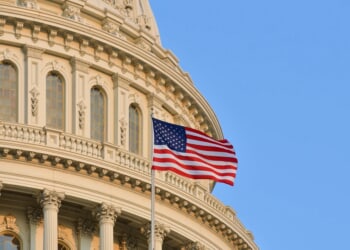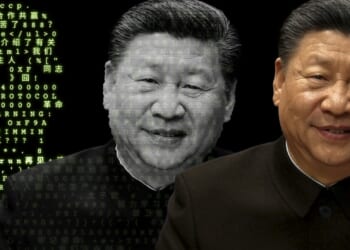Op-ed views and opinions expressed are solely those of the author.
Cause I’m leavin’ on a jet plane
Don’t know when I’ll be back again
Oh baby, I hate to go
–John Denver
“Leaving on a Jet plane was a song of Vietnam, a plaintiff cry into the unknown, of love that would vanish with a youth we didn’t know we were losing. We were soldiers once and young, who would come home to a country no longer ours, strangers in a strange land forevermore.”
Ken Burns’ monumental “The Vietnam War” presented an America trapped and defeated in South East Asia. That too was the picture painted by journalists David Halberstam and Neil Sheehan, and most famously by Walter Cronkite. For Burns, South Vietnam was corrupt and oppressive, a land which deserved to fall to the Communists — the standard view of American academics, and reporters.
Left-leaning commentators like Burns never reveal the brutality of Ho Chi Minh, who slaughtered hundreds in his quest to forge a communist state. Neither do they acknowledge a growing list of revisionist historians including Geoffrey Shaw, Mark Moyar, Rufus Phillips, and Louis Sorley, who argue that Hanoi’s victory was not pre-ordained. The latest contribution to that war’s history is Stephen Young’s Kissinger’s Betrayal, a powerful indictment of Kissinger’s collusion with Hanoi to betray South Vietnam. The revisionist arguments are buttressed by declassified American, Soviet, and Vietnamese documents. Here is the “smoking gun,” the evidence that the Communists never had any intention of honoring the 1954 Geneva Accords or any agreement that impeded their conquest of the South.
President Eisenhower had made American support for South Vietnam abundantly clear in his October 1954 communiqué to Vietnamese president Ngo Dinh Diem pledging economic and military assistance. That pledge was reinforced when John Kennedy sent military advisors to Vietnam and in 1965 when Lyndon Johnson began the large-scale deployment of American troops to thwart communist aggression. In large-scale confrontations, communists were being beaten and beaten badly. Kill ratios were incredible, American firepower destroying whole North Vietnamese regiments. The American press, however, was reporting otherwise to a nation growing disenchanted with a never-ending conflict.
With Johnson, in the face of growing anti-war sentiment, not running for re-election, Nixon defeated Hubert Humphrey to win the 1968 presidential race on a campaign promise to end American involvement. Seeking an exit strategy, Nixon continued Johnson’s Vietnamization policy of turning the war over to the Vietnamese while drawing down American troops. Reporters seldom credited American or ARVN successes, or that Tet, contrary to the media, had been an American victory
By 1972, with US ground forces gone, Hanoi launched a full-scale conventional invasion. Initially successful, ARVN’s Herculean effort backed by American air power threw them back. By 1975, however, the Watergate scandal had forced Nixon from office, a less resolute Gerald Ford was now president. While Moscow and Peking turned on the supply spigot, the U.S. Congress, cut off all assistance to South Vietnam. As South Vietnam’s army disintegrated, Ford did not feel he had the power or Congressional backing to order the B-52s back into action to bomb the North Vietnamese columns stretched out on the highways. The road to Communist victory was open. South Vietnam’s collapse was cheered by the media, university campuses, the “smart set” and by Congress itself. Hanoi conquered after all.
In his afterword, Stephen Young excoriates the anti-war movement for the evil it visited on South Vietnam, for denigrating those who served, for poisoning America’s self-confidence and for opening a cultural civil war that continues to this day. He rebukes Secretary of Defense Robert McNamara for failing to comprehend the Vietnamese as a people whose cultural proclivities rejected Hanoi’s evil ambition, a failure of understanding repeated in Afghanistan by decision-makers once again ignoring a country’s natural disposition.
For Vietnamese the price of defeat was tyranny or exile; for American veteran,s it was to be shunned in their own land. The country wanted to forget.
DONATE TO BIZPAC REVIEW
Please help us! If you are fed up with letting radical big tech execs, phony fact-checkers, tyrannical liberals and a lying mainstream media have unprecedented power over your news please consider making a donation to BPR to help us fight them. Now is the time. Truth has never been more critical!
Success! Thank you for donating. Please share BPR content to help combat the lies.
We have no tolerance for comments containing violence, racism, profanity, vulgarity, doxing, or discourteous behavior. If a comment is spam, instead of replying to it please click the ∨ icon below and to the right of that comment. Thank you for partnering with us to maintain fruitful conversation.







![‘We All Owe Him (Elon) a Huge Debt of Gratitude’ [WATCH]](https://www.right2024.com/wp-content/uploads/2025/03/‘We-All-Owe-Him-Elon-a-Huge-Debt-of-Gratitude-350x250.jpg)

![Trump's Admin Guts Another ‘Rogue Government Agency with Zero Accountability’ [WATCH]](https://www.right2024.com/wp-content/uploads/2025/03/Trumps-Admin-Guts-Another-‘Rogue-Government-Agency-with-Zero-Accountability-350x250.jpg)







